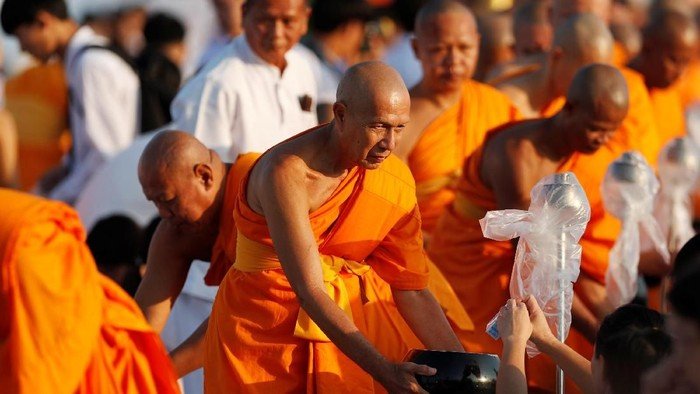BANGKOK — A scandal involving a woman known only as “Miss Golf” has shaken Thailand to its core, exposing a web of blackmail, hypocrisy, and the erosion of spiritual authority in the deeply Buddhist nation.
The Scandal That Rocked the Sangha
Thai police confirmed the arrest of a 26-year-old woman—dubbed “Miss Golf” by local media—who allegedly extorted at least nine Buddhist monks using secretly recorded sex tapes. Investigators uncovered a trove of 80,000 explicit photos and videos during a raid on her Bangkok apartment, along with evidence of 385 million baht (approximately $10.5 million) in extortion payments over three years.
The case unraveled in June when an abbot abruptly abandoned his temple after Miss Golf demanded 7 million baht ($190,000) in child support, claiming pregnancy from their encounter. But he wasn’t her only target. Police traced multiple transfers from monks’ accounts—funds later gambled away online.
A Crisis of Faith in the Land of Smiles
In Thailand, where 95% of the population follows Theravada Buddhism, monks are revered as moral pillars. They renounce worldly possessions, abstain from sex, and depend on alms for survival. Yet this scandal is the latest in a string of controversies—from drug trafficking to lavish spending—eroding public trust in the Sangha, Thailand’s monastic community.

Key Revelations:
- Monastic Vulnerability: Miss Golf exploited monks’ fear of exposure, knowing expulsion from the order would bring lifelong shame.
- Systemic Failures: Temples lack oversight, enabling secrecy. Unlike Catholic confessionals, Buddhist monasteries have no formal mechanism for accountability.
- Digital Temptation: The case highlights how smartphones—once banned in monasteries—have become tools for both sin and blackmail.
A Nation’s Soul-Searching
The scandal has sparked fierce debate:
- Traditionalists demand stricter Vinaya (monastic code) enforcement, including defrocking offenders.
- Reformers call for modernizing temple governance, citing similar sex-and-money scandals in 2018 and 2020.
- The Government has launched a hotline for reporting “misbehaving monks,” while prosecutors weigh charges against Miss Golf for extortion, money laundering, and possessing stolen assets.
The Bigger Picture: Buddhism in the Digital Age

This isn’t just about one woman or nine monks. It’s a parable for how ancient institutions struggle in modernity:
- Hypocrisy vs. Humanity: Should monks, often isolated from worldly experiences, be held to superhuman standards?
- Cultural Collision: Thailand’s $13 billion tourism industry commodifies spirituality (think tattooed “holy monks”), blurring sacred-profane lines.
- Generational Shift: Young Thais, disillusioned by scandals, increasingly turn to secularism—a trend mirrored in Sri Lanka and Myanmar.
Miss Golf’s trial will be a spectacle, but the real reckoning is for Thailand’s Buddhist establishment. As one senior monk told The Bangkok Post anonymously: “We must purify, or perish.”
Why This Matters Beyond Thailand
From Vatican banking scandals to evangelical televangelists, no faith is immune to corruption. But in Thailand—where temple bells still dictate daily life—this case forces a painful question: Can spirituality survive the age of smartphones and sex tapes?
Bali’s Silent Parallel: When Sacred Traditions Meet Modern Temptations
As Thailand grapples with the fallout of its monastic scandal, Bali—another spiritual epicenter where religion permeates daily life—watches with uneasy recognition. The Island of Gods is no stranger to the collision between ancient piety and modern vice.

Bali’s Unspoken Tensions
While Balinese Hinduism maintains stricter temple hierarchies than Thailand’s Buddhist Sangha, similar undercurrents exist:
- Pemangku (Priest) Scandals: Rare but explosive cases of priests misusing temple funds or engaging in illicit relationships still surface, like the 2022 Karangasem incident where a high priest was defrocked for embezzling offerings.
- Digital Dharma: Young Balinese priests now grapple with smartphones—tools for preserving sacred texts but also gateways to temptation. The Parisada Hindu Dharma even issued guidelines on social media use for clergy after a 2023 viral video showed a priest flirting on Tinder.
- Tourism’s Toll: Just as Thailand’s monks face commodification, Bali’s spiritual leaders navigate a world where sacred rituals become Instagram backdrops. At Tanah Lot, priests whisper about tourists offering bribes for “exclusive” blessing videos.
A Different Path?
Yet Bali’s adat (customary law) system provides safeguards Thailand lacks:
- Public Shaming: Offending priests face sepekang (social exile) not just from temples but entire communities.
- Financial Transparency: Major temples like Besakih publish donation records quarterly—a practice Thailand’s monasteries are now considering.
- Youth Engagement: Groups like Pasikian Muda Bali train digital-native teens to become temple guardians, blending tradition with tech literacy.
The Lesson for Both Paradises
As Thai authorities scramble to restore faith in their Sangha, Bali offers a tentative blueprint: Tradition can evolve without eroding. But the “Miss Golf” scandal serves as a warning—no spiritual fortress is immune to 21st-century corruption.
For now, Balinese Hindus whisper prayers at Pura Dalem, the temple of introspection, hoping their island’s balance of sekala (seen) and niskala (unseen) virtues holds firm. As one Pemangku in Ubud told us: “Our offerings must now include wisdom against smartphones and greed.”
Final Thought:
From Bangkok’s monasteries to Bali’s pura, the challenge is the same—how to keep the sacred sacred when even holy men carry iPhones. The answer, perhaps, lies not in rejecting modernity, but in teaching discernment alongside devotion.
Bali’s Quiet Vigilance
While Thailand’s scandal dominates headlines, Bali’s quieter approach—mixing rigid tradition with pragmatic adaptation—may prove more sustainable. But as the “Miss Golf” case shows, eternal vigilance is the price of spiritual purity in our connected age.
By Giostanovlatto





